Guest blogged by Ernest A. Canning
 Good news for democracy. Bad news for the GOP deceivers and the billionaire sociopaths, like the Koch brothers, who fund them. Missouri's courts have shown that their state's nickname, "The Show-Me State," is apropos.
Good news for democracy. Bad news for the GOP deceivers and the billionaire sociopaths, like the Koch brothers, who fund them. Missouri's courts have shown that their state's nickname, "The Show-Me State," is apropos.
In Weinschenk v. State (2006), the MO Supreme Court struck down a GOP-enacted polling place photo ID law because it violated the Equal Protection clause of the MO Constitution which treats voting as a "fundamental right." It recognized a compelling governmental interest in preventing voter fraud, but observed that "the Photo-ID Requirement is intended to prevent only impersonation of a registered voter and will not affect absentee ballot or registration fraud."
As the GOP could not muster evidence of in-person impersonation, they failed to establish that their 2006 Photo ID law was narrowly tailored to achieve a compelling governmental interest. The Court, in Weinschenk, based on the facts presented, also determined that the 2006 GOP Photo ID law operated as an unconstitutional poll tax, thereby violating the 24th Amendment to the U.S. Constitution.
But since when have Republicans hell-bent on undermining our system of electoral democracy let a few negative court rulings or fundamental Constitutional rights stand in their way?...
'Tricking voters into giving up their rights'
Undaunted, in 2011 Missouri's GOP legislators, many of whom are members of the infamous right-wing billionaire-funded American Legislative Exchange Council (ALEC), sought to re-enact Photo ID legislation (SB3). But, this time the effort failed when SB3 was vetoed by Gov. Jay Nixon (D). The Governor, like the MO Supreme Court, was not taken in by the GOP "voter fraud" canard. "Disenfranchising certain classes of persons," Nixon said, "is not acceptable."
The MO GOP then not only sought to by-pass both the governor and the Supreme Court, but to deceive the citizens of the Show-Me State via SJR2 --- a Photo ID ballot initiative that would amend the state's constitution. Where the true goal of Photo ID laws is the disparate disenfranchisement of otherwise eligible citizens who tend to vote against the GOP, SJR2 included an Orwellian ballot summary label: "the Voter Protection Act."
SJR2 was promptly challenged in Aziz v. Mayer [PDF], a lawsuit filed by the Advancement Project, the Fair Elections Legal Network and the American Civil Liberties Union (ACLU). Denise Lieberman, a senior attorney with the Advancement Project, described SJR2 as a "cynical and shameful [effort to use] the voting process itself to trick voters into giving up their rights."
On March 27, 2012 Cole County Circuit Judge Patricia S. Joyce agreed. The proposed constitutional amendment requiring Photo ID for all voters at the polling place is not designed to "protect" voters. To the contrary, she found, it is simply a ploy designed to strip a minority of voters of a fundamental right.
Unfortunately, this latest ruling only prevents the GOP from placing the measure on the ballot under its deceptive "Voter Protection Act" label. Judge Joyce's decision, which permits the MO legislature to come up with a new ballot summary by May 18, does not prevent the hard right, in MO, MN and elsewhere from using mass media propaganda campaigns, paid for via the infamous Citizens United decision, in order to carry out their cynical, democracy-destroying plot.
Relentless revolutionary power
The MO Supreme Court's Weinshenk decision touched upon the vital distinction between a "voter ID law" and a "photo ID law." In 2002, MO adopted a "voter ID law" in order to comply with the federal Help America Vote Act (HAVA). Under the 2002 law, identification could be established not only by the limited forms acceptable by way of a Photo ID, but by "a utility bill, bank statement, expired passport, out-of-state driver's license, or other commonly available documents of identification."
The Court stated [emphasis added]:
The record before the MO Supreme Court in Weinschenk was compelling. The Court found, and the proponents of the 2006 MO Photo ID law conceded, that there had not been a single case of in person voter impersonation in MO since the adoption of the 2002 voter ID law and that "voter impersonation fraud is not a problem in Missouri."
Yet, after Gov. Nixon vetoed the 2011 Photo ID law [SB3], Sen. Bill Stouffer (R), the majority caucus leader and author of SB3, complained that "it's a shame the governor doesn't understand the necessity of this bill to fight voter fraud."
It would be a mistake of major proportions to assume that Stouffer, or any other member of the American hard right, actually believes that Photo ID laws are necessary to prevent "voter fraud."
As Paul Krugman recognized in The Great Unraveling, the 21st Century American hard right fits the definition of a "revolutionary power" as that term was described by Dr. Henry Kissinger in A World Restored --- "a movement that does not accept the legitimacy of our current political system."
Krugman observed:
"[I]t is the essence of a revolutionary power," Dr. Kissinger wrote in A World Restored, "that it possesses the courage of its convictions, that it is willing, indeed eager, to push its principles to their ultimate conclusion."
That voter suppression, as opposed to "voter protection," is the true purpose of Photo ID laws is reflected by the chilling 1980 remarks made by right wing demigod and ALEC co-founder Paul Weyrich to a right-wing Christian audience.
"I don't want everybody to vote," Weyrich admitted (see haunting video at right). "Our leverage in the elections goes up as the voting populace goes down," he added after denigrating those who seek "good government" through maximum, informed voter participation, as people who suffer from what he described as "goo goo syndrome."
It should come as no surprise that ALEC's effort to stave off the loss of corporate members through the announcement that it had disbanded its Public Safety and Elections Task Force, which had been responsible for the ALEC model Photo ID legislation, was promptly followed by the announcement by the National Center for Public Policy (NCPP) to create a "Voter Identification Task Force." After all, many of the same billionaire foundations which fund NCPP also fund ALEC.
It should also come as no surprise that, in the wake of Judge Joyce's decision, Missouri state Rep. Shane Schoeller (R), a public member of ALEC, introduced a Resolution designed to keep their Photo ID measure on the Nov. 2012 ballot, sans the Orwellian "Voter Protection Act" label.
They may not have succeeded in fooling the courts, but there's still the possibility that their deceptions will succeed in the court of public opinion.
Vigilance in defense of democracy
"A Republic, if you can keep it." - Benjamin Franklin
While, as will be discussed below, Weinschenk contains significant factual and legal findings that will assist legal challenges to Photo ID laws throughout the nation, in states like MO and MN, where the hard right has adopted the cynical tactic of seeking to persuade citizens to vote to dismantle democracy under the guise of protecting against "voter fraud," the defenders of democracy face a daunting task.
It is a task made all the more difficult given the miserable performance of the mainstream corporate-owned media --- a point underscored by the series of articles published by Brad Friedman documenting how The New York Times, no less, (America's so-called "paper of record") repeatedly, and at times, willfully misreported a right-wing scam designed to destroy a benevolent organization --- ACORN --- dedicated to registering the same underprivileged class of Americans whom the right wing seeks to illicitly exclude from our voter rolls.
As we reported on March 10, 2010 in "The Real Targets of the ACORN Smear Campaigns: Verifiable Truth, American Democracy", per a report from the Congressional Research Service [PDF], as of October 2009, there had been 46 reported federal, state, and local investigations concerning ACORN; 11 still pending. Those 46 investigations failed to establish a single instance in which an individual, improperly registered by ACORN or its employees, attempted "to vote at the polls." The study revealed that ACORN was often the initiator of official complaints against employees who defraud them, when they turn in fraudulent registrations.
But that reality, as well as the fact that Photo ID laws have nothing to do with combating registration fraud, fails to pierce the cacophony of disinformation that our citizenry is subjected to 24/7 by the corporate MSM as well as the right wing echo chamber.
One problem in overcoming the push for polling place Photo ID restrictions is that we are a culture in which, for those who already possess such ID, showing them has become a matter of course. It is difficult for many citizens who possess a driver's license to appreciate that which the MO Supreme Court, in Weinschenk, expressly found --- that for between 3% & 4% of MO citizens, obtaining a Photo ID can prove a significant, cumbersome, expensive and, at times, impossible burden.
Photo ID as unconstitutional poll tax
Although Weinschenk was decided before the U.S. Supreme Court handed down its opinion in Crawford vs. Marion County Board of Elections (2008), the MO Supreme Court decision should still be cited by attorneys seeking to challenge Photo ID laws on the basis of the U.S. Constitution.
"This case," the MO Supreme Court stated in Weinschenk, "stands in stark contrast to the Georgia and Indiana cases, for their decisions were largely based on those courts' findings that the parties had simply presented theoretical arguments and had failed to offer specific evidence of voters who were required to bear these costs in order to exercise their right to vote."
In Crawford, the U.S. Supreme Court's plurality opinion, upholding Indiana's Photo ID law, stressed that evidence of an undue burden could produce a different result in a future challenge.
In Harper vs. Virginia Bd. of Elections (1966), the U.S. Supreme Court held that a $1.50 poll tax was unconstitutional. Applying that concept, the MO Supreme Court observed:
84-year old, home born Ruthelle Frank would learn just how much more expensive the right to vote could have become under Wisconsin's photo ID law when she faced the prospect of expending a $200 fee to obtain a record of her birth from the Badger State's Register of deeds.
So, even if the MO GOP succeeds in its cynical effort to deceive voters in The Show-Me State into adopting Photo ID as an amendment to the MO Constitution --- into fooling the majority of voters into denying fundamental rights to a minority --- the prospect of a legal challenge under the U.S. Constitution remains.
That possibility holds true --- and holds hope --- for voters in states such as Pennsylvania, Kansas, Alabama, Wisconsin, Tennessee, Texas, South Carolina, Mississippi, Arizona and the others where Republicans continue to work to keep legal voters from voting in hopes of electoral gain this November. The question is: Will such a legal challenge come soon enough to preserve what's left of our democratic Republic?
Ernest A. Canning has been an active member of the California state bar since 1977. Mr. Canning has received both undergraduate and graduate degrees in political science as well as a juris doctor. He is also a Vietnam vet (4th Infantry, Central Highlands 1968). Follow him on Twitter: @Cann4ing.


 A Pretty Weak 'Strongman': 'BradCast' 10/30/25
A Pretty Weak 'Strongman': 'BradCast' 10/30/25 'Green News Report' 10/30/25
'Green News Report' 10/30/25
 Proposal for 'First Politically Viable Wealth Tax' Takes Shape in CA: 'BradCast' 10/29/25
Proposal for 'First Politically Viable Wealth Tax' Takes Shape in CA: 'BradCast' 10/29/25 Monster Storm, Endless Wars, Gamed Elections:
Monster Storm, Endless Wars, Gamed Elections: 'Green News Report' 10/28/25
'Green News Report' 10/28/25 Let's Play 'Who Wants
Let's Play 'Who Wants Sunday 'Cartoonists Dilemma' Toons
Sunday 'Cartoonists Dilemma' Toons Exiled NOAA Scientists Resurrect Critical Disaster Database: 'BradCast' 10/23/25
Exiled NOAA Scientists Resurrect Critical Disaster Database: 'BradCast' 10/23/25  'Green News Report' 10/23/25
'Green News Report' 10/23/25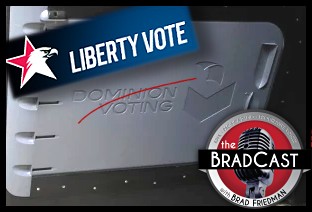 Trump-Allied GOP Partisan Buys Dominion Voting Systems: 'BradCast' 10/22/25
Trump-Allied GOP Partisan Buys Dominion Voting Systems: 'BradCast' 10/22/25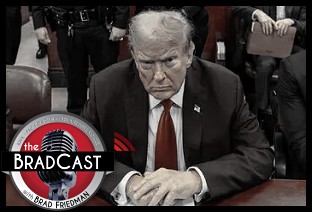 Trump, Republican Law(lessness) & (Dis)Order: 'BradCast' 10/21/25
Trump, Republican Law(lessness) & (Dis)Order: 'BradCast' 10/21/25 'Green News Report' 10/21/25
'Green News Report' 10/21/25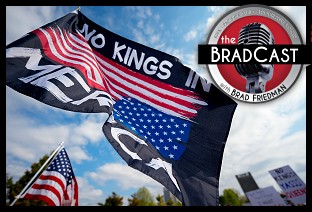 Celebrating 'No Kings': 'BradCast' 10/20/25
Celebrating 'No Kings': 'BradCast' 10/20/25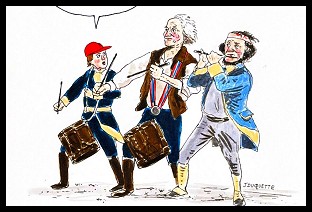 Sunday 'How It Started' Toons
Sunday 'How It Started' Toons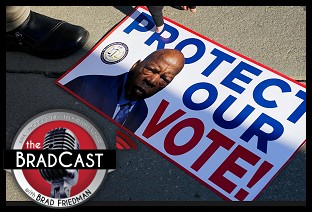 SCOTUS Repubs Appear Ready to Gut Rest of Voting Rights Act: 'BradCast' 10/16/25
SCOTUS Repubs Appear Ready to Gut Rest of Voting Rights Act: 'BradCast' 10/16/25 'Green News Report' 10/16/25
'Green News Report' 10/16/25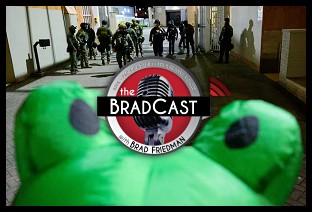 The 'Epstein Shutdown' and Other Autocratic Nightmares: 'BradCast' 10/15/25
The 'Epstein Shutdown' and Other Autocratic Nightmares: 'BradCast' 10/15/25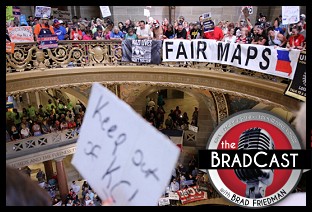 Group Vows to Block MO's GOP U.S. House Gerrymander: 'BradCast' 10/14/25
Group Vows to Block MO's GOP U.S. House Gerrymander: 'BradCast' 10/14/25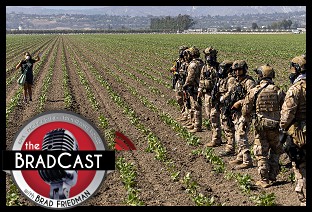 Trump Labor Dept. Warns Trump Policies Sparking Food Crisis: 'BradCast' 10/9/25
Trump Labor Dept. Warns Trump Policies Sparking Food Crisis: 'BradCast' 10/9/25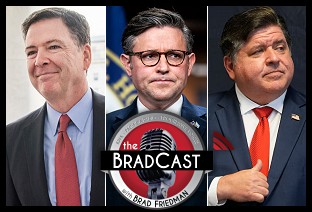 Trump's Losing Battles: 'BradCast' 10/8/25
Trump's Losing Battles: 'BradCast' 10/8/25 Trump, Roberts and His Stacked, Packed and Captured SCOTUS: 'BradCast' 10/7/25
Trump, Roberts and His Stacked, Packed and Captured SCOTUS: 'BradCast' 10/7/25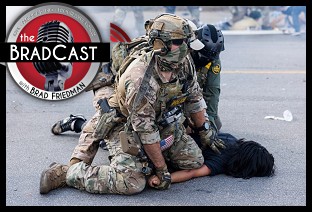 Trump Attempting His 'Invasion from Within': 'BradCast' 10/6/25
Trump Attempting His 'Invasion from Within': 'BradCast' 10/6/25 Biden Budget Expert: Mass Firings in Shutdown 'Illegal': 'BradCast' 10/2/25
Biden Budget Expert: Mass Firings in Shutdown 'Illegal': 'BradCast' 10/2/25 Why is DOJ Suing 'Blue' States for Their Voter Databases?: 'BradCast' 10/1/25
Why is DOJ Suing 'Blue' States for Their Voter Databases?: 'BradCast' 10/1/25
 VA GOP VOTER REG FRAUDSTER OFF HOOK
VA GOP VOTER REG FRAUDSTER OFF HOOK Criminal GOP Voter Registration Fraud Probe Expanding in VA
Criminal GOP Voter Registration Fraud Probe Expanding in VA DOJ PROBE SOUGHT AFTER VA ARREST
DOJ PROBE SOUGHT AFTER VA ARREST Arrest in VA: GOP Voter Reg Scandal Widens
Arrest in VA: GOP Voter Reg Scandal Widens ALL TOGETHER: ROVE, SPROUL, KOCHS, RNC
ALL TOGETHER: ROVE, SPROUL, KOCHS, RNC LATimes: RNC's 'Fired' Sproul Working for Repubs in 'as Many as 30 States'
LATimes: RNC's 'Fired' Sproul Working for Repubs in 'as Many as 30 States' 'Fired' Sproul Group 'Cloned', Still Working for Republicans in At Least 10 States
'Fired' Sproul Group 'Cloned', Still Working for Republicans in At Least 10 States FINALLY: FOX ON GOP REG FRAUD SCANDAL
FINALLY: FOX ON GOP REG FRAUD SCANDAL COLORADO FOLLOWS FLORIDA WITH GOP CRIMINAL INVESTIGATION
COLORADO FOLLOWS FLORIDA WITH GOP CRIMINAL INVESTIGATION CRIMINAL PROBE LAUNCHED INTO GOP VOTER REGISTRATION FRAUD SCANDAL IN FL
CRIMINAL PROBE LAUNCHED INTO GOP VOTER REGISTRATION FRAUD SCANDAL IN FL Brad Breaks PA Photo ID & GOP Registration Fraud Scandal News on Hartmann TV
Brad Breaks PA Photo ID & GOP Registration Fraud Scandal News on Hartmann TV  CAUGHT ON TAPE: COORDINATED NATIONWIDE GOP VOTER REG SCAM
CAUGHT ON TAPE: COORDINATED NATIONWIDE GOP VOTER REG SCAM CRIMINAL ELECTION FRAUD COMPLAINT FILED AGAINST GOP 'FRAUD' FIRM
CRIMINAL ELECTION FRAUD COMPLAINT FILED AGAINST GOP 'FRAUD' FIRM RICK SCOTT GETS ROLLED IN GOP REGISTRATION FRAUD SCANDAL
RICK SCOTT GETS ROLLED IN GOP REGISTRATION FRAUD SCANDAL VIDEO: Brad Breaks GOP Reg Fraud Scandal on Hartmann TV
VIDEO: Brad Breaks GOP Reg Fraud Scandal on Hartmann TV RNC FIRES NATIONAL VOTER REGISTRATION FIRM FOR FRAUD
RNC FIRES NATIONAL VOTER REGISTRATION FIRM FOR FRAUD EXCLUSIVE: Intvw w/ FL Official Who First Discovered GOP Reg Fraud
EXCLUSIVE: Intvw w/ FL Official Who First Discovered GOP Reg Fraud GOP REGISTRATION FRAUD FOUND IN FL
GOP REGISTRATION FRAUD FOUND IN FL

































